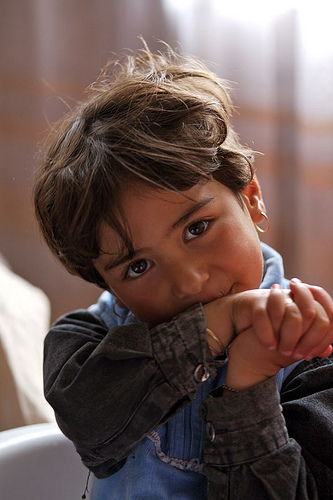
Sharing power is an essential principle of TBRI® (Purvis, K., Cross, Dr. R., & Hurst, J.R. [2012]. Trust-Based Relational Intervention: TBRI® Connecting Principles [Instructor Workbook]. Fort Worth, TX: TCU Institute of Child Development.). Children feel valued and safe knowing that their needs and wants are heard and taken into consideration. While parents must be “the boss” to keep children safe and learn all the things they need to know to be successful as adults, being in charge does not have to mean dictatorship. Often the most effective leaders are leading rather than commanding, and our children are generally happier to comply when they know their voices will be heard.
Compromising is one way to share power that may not come easily to all parents. The first time one of my friends observed me prompting my son, “Are you asking for a compromise?” his eyebrows about shot off his face. In his Hispanic family, what mom said was law. Adoption complicates parenting, though; because a judge made the decision that this child would be moved half-way around the world to live with a family he or she had never met, there is often a fear around powerlessness and a desire to control what the child can control. When compromising is uncomfortable for a parent, choices may be an easier way to share power.
When offering choices to your child, the parent is still deciding what and when, but allowing the child to have input on the specifics. For example, I may decide that we are having vegetables for dinner at 6 pm, but I can allow my son to choose Brussels sprouts or carrots – both of which we have in the refrigerator. I would not ask him what vegetable he would like for dinner, opening up additional possibilities because he might ask for a vegetable that is not in season or would requires a trip to the grocery and additional spending. If I would say no to something he might choose then it is not a fair choice. In the same way, it can be overwhelming to a child, especially those who may have come from a place of scarcity, to have too many choices from which to choose. You may have noticed the halting that occurs when offered too many choices if you have instructed your child to clean his or her bedroom and nothing gets done. It isn’t that your child is being obstinate but rather that they do not know where to begin. (So far we have had the most success with small cleaning tasks at a time; done sequentially the room still does get clean.) Two or three specific choices are plenty for most children.
Offering limited choices helps the child be able to mentally manage the decision to be made, but it also allows the parent to feel that he or she maintains power while still sharing it with the child. Another example of an appropriate choice would be allowing a child to choose if he or she gets dressed before breakfast in the morning or eats breakfast before getting dressed or the child could choose to drink chamomile tea before or after picking up the toys prior to bedtime. In each instance the parent is still leading the activities while allowing the child some input on the method or order.
It is important for parents to remember that choices are not threats or power plays. All options presented must be acceptable and positive. Hang up your towel or go sit in time out is not a choice, it is a threat. Choices can be used in teaching discipline though. If you would like to yell, you can play outside or you can use an inside voice while playing inside. Which would you like to choose? The principle behind giving children a choice is sharing power with them rather than forcing your will upon them.
Photo Credit: unicefiran
